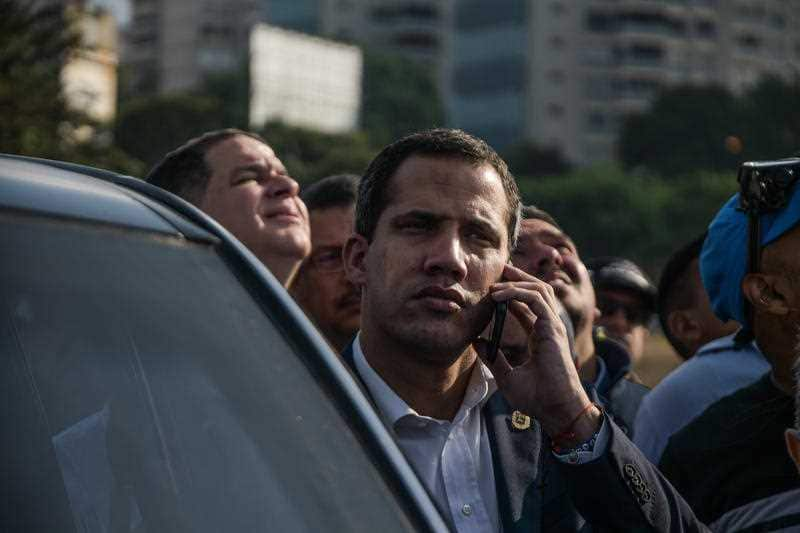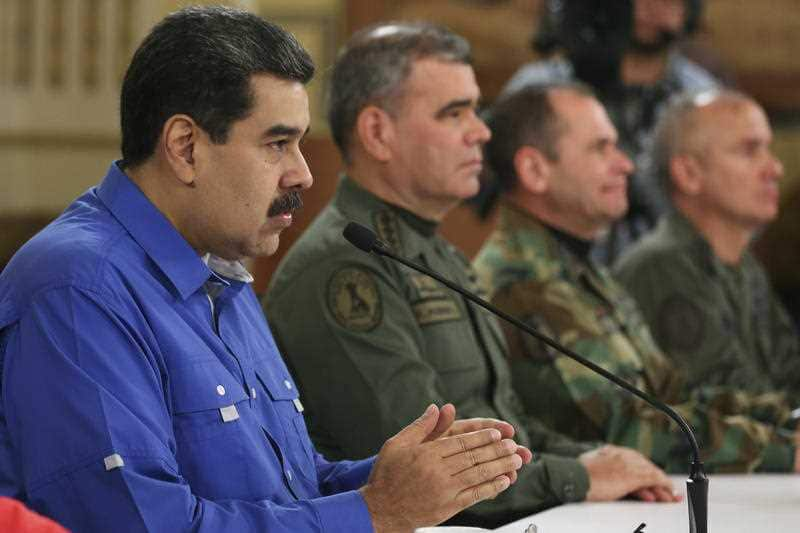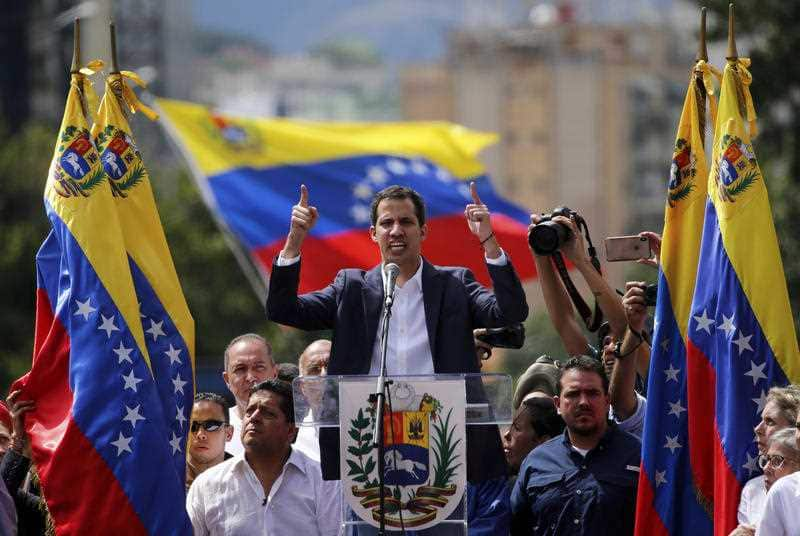Clashes erupted outside the base and elsewhere as President Nicolás Maduro’s government and his supporters called Juan Guaidó’s manouvre an attempted coup.
Here is how Venezuela, once one of Latin America’s most prosperous countries, has reached this point in an economic and political crisis.

Guaidó challenges Maduro’s leadership
Just two weeks after Mr Maduro was sworn in for a second term in January, Mr Guaidó declared himself the interim president, directly challenging the country’s leadership.
Tens of thousands of protesters rallied in support of Mr Guaidó. The United States, Canada and many Latin American and European countries recognised him as the legitimate head of state.
Mr Maduro, in return, severed remaining diplomatic ties with the United States. He also stopped an effort by Mr Guaidó and his foreign allies to bring large amounts of aid into Venezuela, sealing off the border with Colombia and Brazil.
How has Maduro retained power?
Mr Maduro, who assumed the presidency after the death of his mentor, Hugo Chávez, in 2013, has overseen a drastic unraveling of Venezuela’s economy. While he has blamed sanctions imposed by the United States, others have attributed Venezuela’s economic demise to mismanagement and corruption.
Mr Maduro has centralised power in the executive branch, suppressing dissent through violence and intimidation, and winning the loyalty of the military by giving it control of lucrative industries.

In 2017, as protests escalated, Mr Maduro sidelined the opposition-controlled legislature, the National Assembly, by ordering the creation of a new legislative body, known as the Constituent Assembly, which was asked to rewrite the constitution. He jailed prominent members of the opposition, leaving it largely ineffective for many months.
In May 2018, Mr Maduro won re-election to a new six-year term in the midst of a financial and humanitarian crisis. Coercion and vote rigging were widely reported. By the time of Mr Maduro’s inauguration on January 10, many countries did not recognize his new term as legitimate, including the United States, Canada and a dozen Latin American nations.
Who is Juan Guaidó?
Mr Guaidó, 35, was largely unknown before the National Assembly elected him as its leader in January. He also leads one of the country’s opposition parties, Voluntad Popular.
He has long been a critic of Mr Maduro and Mr Chávez, becoming politically active as a student leader in Caracas and leading protests against Mr Chávez’s clampdown on press freedom.

His party has taken a hard-line stance against Mr Maduro’s government, organizing street protests and rallies. Mr Guaidó also has visited Colombia, Brazil and other sympathetic neighbors in Latin America, in defiance of a travel ban. He is under constant threat of arrest.
Mr Guaidó says his intention now is to serve as the interim president of the country until new national elections can be held, a right he and the National Assembly assert is protected under Venezuela’s constitution. Mr Guaidó has not yet said when elections might be held.
How bad is the country’s humanitarian crisis?
Consumer prices have skyrocketed, and the International Monetary Fund expects the inflation rate to reach 10 million per cent in 2019, which would be one of the worst cases of hyperinflation in modern history.
Violence and hunger are widespread. Food shortages have reached new highs in recent months, and 80 per cent of Venezuelan households don’t have sufficient access to food, according to monitoring groups. Grocery store shelves are bare. Hospitals struggle to treat severely malnourished children.
The country’s public health system has collapsed, leaving many without access to lifesaving medicine. The rates of several preventable diseases have risen.
The migration of Venezuelans out of the country has reached levels not seen before in modern history. More than 3 million people have left since 2014, according to the United Nations migration agency, setting off a regional crisis that has left neighbouring countries grappling with how to respond.
What happens next?
It is unclear how the crisis will be resolved, with two men on opposite sides of the political spectrum proclaiming themselves president. Mr Guaidó has cited an article of Venezuela’s Constitution that transfers power to the leader of the National Assembly in the event that the presidency becomes vacant.
President Donald Trump quickly recognised Mr Guaidó as the country’s leader in January and called the National Assembly the “only legitimate branch of government duly elected by the Venezuelan people.” About 50 countries, including much of Latin America and Europe, have joined the United States in supporting Mr Guaidó.
Mr Trump, with the 2020 election clearly in mind, has sought to frame the Venezuela crisis as an example of the failure of socialism. His administration has taken a number of economic steps to pressure Maduro, including a ban on US purchases of Venezuela oil, the country’s economic lifeline. The United States also has called on other members of the United Nations to revoke the credentials of Mr Maduro’s delegation.
Mr Trump has not ruled out the use of military force in Venezuela, setting up a potential conflict with Russia, which backs Mr Maduro. He also is supported by longtime Venezuela allies Cuba and Bolivia.
By Megan Specia © 2019 The New York Times

